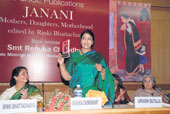 |
| Woman tales: Rinki Bhattacharya (left) and Union minister Renuka Chowdhury at the launch of Janani |
One doesn’t normally draw on the teachings of Rajneesh while referring to a relationship between a mother and her offspring. But the new-age Guru of a forgotten age put it well. “The moment a child is born, the mother is also born. She never existed before. The woman existed, but the mother, never. A mother is something absolutely new,” he said.
It makes sense, especially when put in the context of that special relationship between a mother and her daughter. When you are five, she’s your goddess — you smear your face with her lipstick and totter around in her high heels. That’s the way it is until you are about 13, when she suddenly becomes the most ignorant, benighted, out-of-touch creature on this planet. And then, somewhere between your twenties and thirties, if you are lucky, she becomes your friend again. And continues to be one till the very end.
Rinki Bhattacharya, director of the Bimal Roy Memorial Committee — the film maker was her father — showcases the relationship in a book published by Sage recently. Bhattacharya is the editor of Janani — Mothers, Daughters, Motherhood, a collection which brings together autobiographical writings of women from different walks of life — noted authors, artistes, academics — who share their experience of being a mother, a daughter, or both. The anthology was recently launched in Mumbai and Delhi.
For Bhattacharya, the idea of bringing together the chronicles of these women and their experiences as mothers and daughters came about quite suddenly. “This was something I had not actually thought about. I am an art critic and I’ve always observed that most eminent painters have dealt with mother-daughter relationships in their paintings. Also, I had made a five-minute audio-visual capsule called Janani, or mother as the inventor of life, which won a lot of acclaim. I believe that was the germination of the idea of doing this narrative collection,” she says.
The contributors to the book include Kamala Das, Shashi Deshpande, Deepa Gahlot, Mallika Sarabhai, Bharati Roy and Nabaneeta Dev Sen. There is also Urmila Pawar, a Dalit writer, and Bhattacharya’s daughter, Anvesha Arya. “Each woman here has her own distinct story to tell and I gave them the space to write it the way they wanted to.”
Motherhood, most believe, is a phenomenon that is difficult to define. “That is why this book has a vast spectrum. Many questions are asked and many experiences shared,” says Bhattacharya, who has also shot a documentary film called Char Diwari on domestic violence. “I do believe that every woman is thinking through her mother. Our mothers are our reference points.”
The collection includes true stories on adoptive motherhood, step-mothering, and single motherhood. On the one hand, the reader encounters the gut-wrenching description of an avoidable abortion, and on the other, the firm choice made by a woman never to be a mother. The narratives vividly depict the whole gamut of the experience of motherhood. “Every piece in the book has an element of stark reality.”
The opening piece, by Bharati Roy, begins with her mother’s death. “Her narration is extremely candid and honest. She actually talks about her mother becoming old and ugly and then dying,” says Bhattacharya.
Dev Sen writes of her two daughters and her own writer mother. And how, post menopause, a new daughter walks into her life. There is a piece in Janani by a Naxalite mother and how she brings up her daughter in spite of adverse conditions. All the narratives underline the view that the mother-daughter relationship is the most simple, and the most complex, of all ties.
A daughter is a mother’s gender partner, her closest ally in the family confederacy, an extension of herself. A mother is also her daughter’s role model and her biological and emotional road map. Between these two women can spring a strong affinity and an equally strong tension.
My own experience of being a mother or with my mother would not be without nuances,” says Bhattacharya. “Initially, I was a very docile and obedient daughter. But then, as I grew up, I changed and became a rebel. In fact, my relationship with my Mom was quite troubled. After I eloped, my mother never accepted me back, though my father did.”
Bhattacharya, who suffered violence in her marriage with director Basu Bhattacharya till she walked out of it, believes that her mother loved her “in her own way though she felt a little threatened because of my closeness to my father”. On the other hand, she says, “I love being a mother and especially a grandmother. But I do firmly believe that mothers and daughters can never be best friends. At some point in time, the mother always tends to get protective and questioning and I think it’s but natural for her to be that way,” she adds.
Why hasn’t she written her own narrative then? “I have not written about myself in Janani since each of these 19 women has said what I would like to say.”
Bhattacharya also reveals that she shares a very strong bond with her daughters. “I am a perfectionist and I almost single-handedly brought up my kids. Every mother and child should have the space where they don’t feel threatened, where they can talk to each other about every conceivable thing,” she says.










